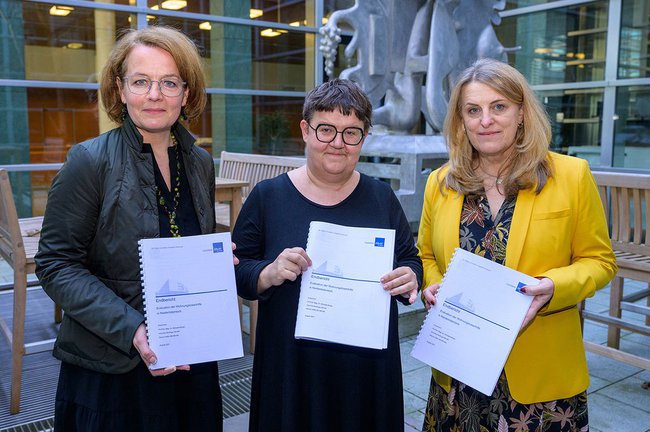Study on Homelessness Assistance in Lower Austria
The St. Pölten UAS was commissioned by the federal state of Lower Austria to conduct a study to further develop homelessness assistance.
The federal state of Lower Austria assigned the St. Pölten University of Applied Sciences to conduct a study to evaluate homelessness assistance in Lower Austria. Today, the author of the study, Michaela Moser, and the regional ministers Christiane Teschl-Hofmeister and Ulrike Königsberger-Ludwig presented the results.
The final report shows various dimensions that need to be considered in the future to improve services for assistance to the homeless. First steps towards implementation have already been taken. The federal state of Lower Austria is currently working on the creation of so-called "non-compliance" places. Access to these is even more low-threshold than, for example, classic emergency sleeping facilities. In addition, the website https://sozialinfo.noe.gv.at is being revised and a digital map of the facilities is being created.
Low-Threshold Services, Continuous Networking
The report’s objective is to serve as a basis for the further development of homelessness assistance in Lower Austria. The study's proposals include
- improvements in data collection,
- the expansion of particularly low-threshold services,
- improved linkage of existing structures,
- a well-designed information portal on all facilities
- and measures to improve cooperation between homelessness and disability assistance.
A Problem with Many Aspects
According to Michaela Moser, the facilities in Lower Austria are doing a good job. The study was designed to look at the gaps and at the needs which are not yet covered by the public sector. Thus, it is about possibilities for improvement.
Homelessness is a very complex problem with many faces. In addition to visible homelessness, there are also people who can no longer afford their flats and are threatened with eviction or have to live in substandard housing. Domestic violence is also a big issue in connection with homelessness: the difficulty of finding their own living space leads to people staying with their violent partner.
Further Development of Services, More Exchange
According to the study's main conclusion, the systematic and continuous exchange of political decision-makers and specialised departments with the experts of the homelessness assistance programmes and the joint development of an overall strategy to end homelessness is of particular importance for the further development of services.
Michaela Moser carried out the study in collaboration with Veronika Reidinger and Hanna Vettori.

FH-Prof. Mag. Dr. Michaela Moser
Lecturer Department of Social Sciences
FH-Prof. Mag. Dr. Johannes Pflegerl
Head of Research InstituteIlse Arlt Institute for Social Inclusion Research Deputy Academic Director Social Work (MA) Lecturer Deputy Head of Department Department of Social Sciences
